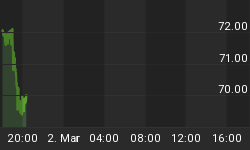The consumer’s still ahead in the race between the mortgage bankers and the pink slips. The four-week moving average of jobless claims is at its highest level since 1996. According to the March unemployment numbers, businesses cut the most jobs in a decade. Given the high levels of consumer debt, it should follow that consumers would turn frugal.
On the other hand, although total vehicle sales slowed a bit in March, they set a 17-million annual pace for the third month in a row. Light trucks had their best month since September. New home sales shot up in March to a record 1.02 million units, and the February figure was revised upward. Existing home sales last month hit an annual rate of 5.44 million, the second highest level ever.
Here in beautiful Dallas/Fort Worth, auto dealers are betting on continued enthusiasm with big expansion plans. And why not? The 5.3% decline in the first quarter was the first in almost a decade. One dealer, the biggest in the state, had his best March ever. With those Texas-sized numbers, no wonder one local dealer has $10 million budgeted for expansion, including a new Hummer franchise.
Interestingly, Texas made the top 5 in terms of jobless claims for the week ending April 7.
Part of this staying power, no doubt, is due to the mortgage refinancing boom that’s sweeping the country. While down 30% from the March 23 peak, the refinancing index remains at 2 ½ times its year-end level. For the record, mortgage rates fell from 8.62% last May to 7.13% in December, and on to 6.89% by late March. The yield curve has steepened since then, however. In what may be a shocker to short term rate watchers, mortgage rates at 7.14% are now above year-end levels. It’s reasonable to think that a)further downward pressure on short rates will have a zero or negative affect on long rates, b) that refinancings will fall sharply as a result, and c) the pink slips and debt burden will soon play larger roles.
The end of the refinancing game would be awful news for the debt-heavy consumer. One hint of consumer stress was the report that growth in credit card debt in February grew at its fastest pace in since 1995. This enthusiasm could be construed positively if not for the dismal consumer confidence. After all, the Conference Board’s measure fell to a 4 ½ year low yesterday. For the first time, consumers now think their current situation has grown weaker. In prior surveys, they just thought the future was a bit dim.
If the consumer is debt-laden, and generally gloomy, he must be borrowing because he has to. This is especially troubling since refinancing booms are typically associated with less, not more, consumer borrowing. That’s because a large portion of the money borrowers suck out of their home equity goes toward paying down other debt. This recent behavior is less indicative of a healthy consumer than one treading water.
If the debt and the layoffs aren’t enough to make consumers check the "gloomy" box on the survey, rising energy prices should do it. The price of gasoline is up 15% over the last month and there’s no relief in sight with refiners operating at or near capacity and summer on the way. AAA predicts $2 gas for summer drivers. Higher energy prices were the culprit in the decision by Phelps Dodge to lay off 500 white collar workers. And Riviera Holdings (a casino company) blames high energy costs on its loss for the quarter, despite instituting an "energy surcharge" on hotel rooms.
Also destined to hit consumers are rising medical costs. Health insurance premiums have been rising for two years, but the bubble economy helped consumers dodge the bullet. In a weaker environment, expect more employers to pass on more health care costs. Employer costs are expected to increase double digits this year, up from 8% last year. In addition, two big auto insurers want to hike rates in (where else?) California. All State is asking for 6.9% and Farmers, 5.5%. Blame higher medical claims and SUVs. They cost 9% more to fix.
In the chutzpa department, MicroStrategy spent 70% of its letter to shareholders explaining how stockholders can subvert the evil short sellers. MicroStrategy remember, was not only a bubble company, but a creative one with the books. The letter comes on the heels of the settlement of a class action suit that gives investors no up-front money, but an I.O.U. These are investors who bought the stock before the company admitted overstating earnings and revenues. According to the company’s annual report, the deal "may result in substantial dilution" of investors' holdings and "may result in downward pressure on the price" of the stock.
Don’t tell that to the short sellers.















